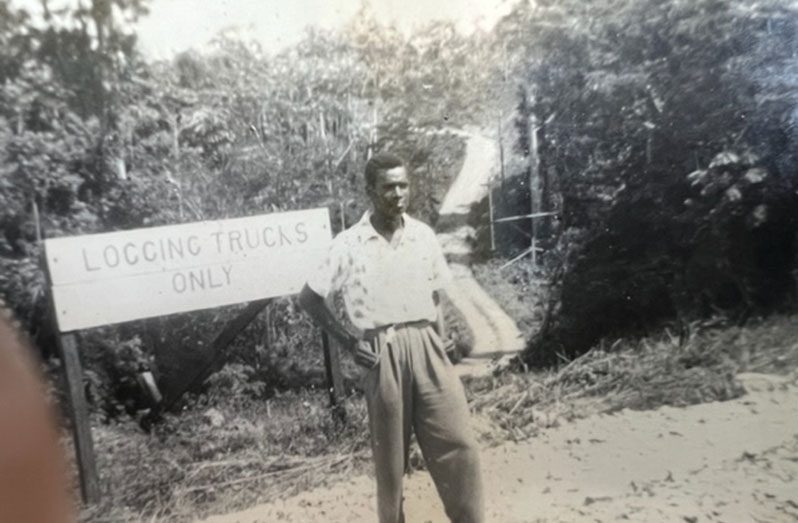By Francis Quamina Farrier
THERE is the saying, “Make new friends but keep the old. One is silver, the other gold.” As the calendars display December 2022, there is quite a lot of excitement and talk about Guyana’s new economy-earning sector of oil and gas. But it is important that this excitement does not cause Guyanese to look away and apparently abandon and forget about the country’s foreign exchange earnings with agriculture and forestry products, which have been so for well over a century.
If that happens, our commodities like bauxite, gold, diamonds, rice, sugar, fish and timber, among others, could be regarded as “has-beens” as far as foreign-exchange earnings go, even though those products continue to garner much for the country’s fiscal power-house.
As you have already observed from the attached photograph, I have practical experience over time in living in the forests of Guyana since I was a youngster – during my pre- and teen years, for that matter – and have learned to respect forest workers, including managers and the forests themselves. The products the forests of Guyana have faithfully produced over the centuries have been a means for hundreds of jobs at any given time. That is also true for how our forests have contributed and kept the Guyana economy consistently buoyant over the decades.
In more recent decades, Guyana’s positive response in keeping our forests as intact and as pristine as possible, to contribute to stemming the ongoing climate change challenges of recent decades, has gained much respect from International organisations and other countries, which place climate change and related issues paramount on their agendas.
Somehow, since the pre-independence era, Guyana has earned itself the unenviable reputation of being referred to as a “poor country”. On many occasions, it has even been twinned with Haiti. That is something that all patriotic Guyanese detest and reject in all sincerity. Unfortunately, there are just too many people – Guyanese and non-Guyanese alike – who are always so ready to latch on to the negative things and constantly repeat them without thinking. For example, there are many Guyanese who so often say that “Guyana is below sea level”; what a misstatement! The reality is, “The coastland of Guyana is below sea level, at high tide.” That is a three-part statement-of-fact, which must be kept as such. To withhold any one of the three parts would make nonsense of the FACT. Therefore, it should always be regarded as a three-part statement, which together constitutes one fact. That is the reality.
Just pause for a moment and consider all of Guyana being below sea level permanently; what then would be the purpose and functioning of the scores of kokers on the coastal belt located East between Corriverton on the Corentyne Coast and Anna Regina, West on the Essequibo Coast? Considering inland areas of the country, how would the mighty Kaieteur Falls plunge 741 feet in a sheer drop, from the top to the gorge below if all of Guyana was below sea level all of the time? Where would the Pakaraima and Kanaku mountain ranges-which are thousands of feet above sea level- be in terms of the topography of our beautiful country? In doing some research, I have discovered that the Friendship area on the East Coast of Demerara, is likely the lowest area in Guyana; however, that needs to be certified by the professional and competent authorities. Nonetheless, it has been noted, the regularity in which the Buxton/Friendship communities suffer from flooding during the rainy seasons.
What is certain, is that all of Guyana’s forested regions are well above sea level. Nonetheless, they sometimes suffer from shorter periods of flooding when there is excessive rainfall within a short period. For those Guyanese who were born on the coastland and have never ventured into the country’s beckoning hinterland, it is somewhat difficult, in some cases, to have a meaningful conversation about this topic, especially with those who do not have open ears, or an open mind. For those coastlanders who have had the experiences of spending time in our hinterland, either working or touring, sharing experiences is almost always a pleasant exchange with those who have had the opportunity to spend periods in our forests.
In closing, two mini-earning foreign exchange items, which are hardly ever mentioned recently, are pet fish and pet birds. Guyana supplies quite a wide range of attractive fish for aquariums. There is also an extensive range of birds, including parrots and macaws, which are sold abroad. While most of us know pretty little about these two areas of Guyanese foreign exchange earnings, they do exist, albeit in a minute way, and have dedicated operators who have established foreign markets for these products.
While oil and gas are the welcomed new “Kids on the Block” so to speak, let us not turn our backs on our old and reliable friends, timber, gold, diamonds, bauxite, rice, fish, coconut products and others. Meanwhile, we can use them to boost our fledging Tourism industry. Just recently, a group of journalists made a government-organised and sponsored fact-finding tour to Yupukari in the North Rupununi, Region 9, to observe, at first hand, how that thriving community is developing its tourism product. While I was not on that particular team visit, I have been to Yupukari and other villages in the Rupununi, Region 9, on many occasions, and have a wide experience of the development of most of the villages over a period of fifty and more years. What is obvious in Guyana is that Forestry, Mining, Agriculture and Tourism, continue to contribute to the country’s Foreign Exchange earnings.




.png)









